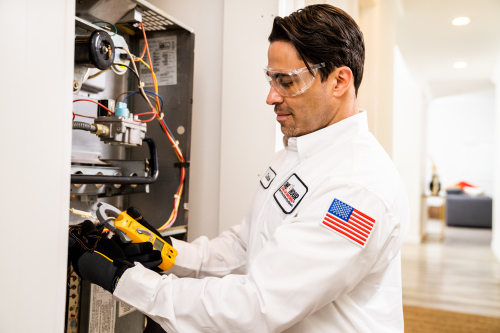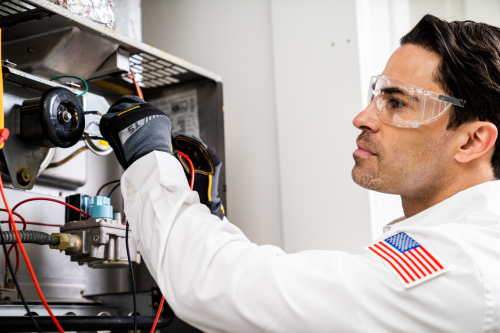
The lifespan of your heating system depends on many things. Although the typical lifespan is about 15 to 20 years, there are several things you can do to ensure you get the most out of your furnace.
Once you consider the exorbitant cost of purchasing a new heater, it becomes even more important to do everything possible to extend its lifespan. Fortunately, that’s exactly what this article will provide.
How to Extend The Lifespan Of Your Furnace
If you want to achieve the longest life possible, you’ll need to make sure your heater receives regular maintenance, along with using it mindfully and giving it proper care. By using each of the following steps, your furnace should reach the far end of its expected lifespan.
Air Filters Must Be Replaced Regularly
It might be easy to forget, but you need to take steps to make sure you replace your air filters at least once every one to three months. Failure to do so will result in reduced airflow. Not only will this make your unit work harder but it can even lead to system failure.
Schedule Regular Preventative Maintenance
In addition to getting your furnace fixed when it’s having problems, it’s also critical to make sure you schedule regular preventative maintenance. Have your furnace checked out at least once a year by a professional, regardless of if it’s experiencing any issues. This will also ensure regular lubrication and cleaning of furnace components, which is a good way to prevent wear and tear.
Ensure You Purchase the Right Size Furnace
Although this point is vitally important, many people fail to purchase the right sized heater for their homes. Additionally, even if someone does recognize the importance of their furnace’s size, they may erroneously believe that it’s only an issue if their heater is too small. The truth, though, is that if your furnace is too small, it’ll be forced to work much harder. Meanwhile, if your heater is too big, it will cycle on and off more frequently than necessary.
Keep Your Heater in a Clean Area
When was the last time you cleaned up around your furnace? This is something you need to keep up with, or else your heater could overheat. Begin by checking the area for any debris, dirt or dust. Next, take the time to ensure that nothing has blocked your exhaust or intake vents. By taking just five minutes to clean up around your furnace, you’ll receive improved airflow, and your heater won’t have to work as hard.
Check for Proper Airflow and Ventilation
Once again, airflow can make or break your heater. Do not allow anything to hinder your registers, ducts or vents, including curtains. Proper airflow is the best way to avoid straining your heating system. Therefore, think carefully about where your registers are, and be sure to work around them. If you don’t, your furnace will exhibit a reduction in efficiency, which can lead to a shorter lifespan.
Optimize Your Thermostat
Optimizing your thermostat is a proven way to help your heater operate more efficiently. In other words, turn your heater down a few degrees before you leave for the day. Then, if you’ve got a thermostat that can be controlled via an app, turn the heater back up shortly before you get home. Otherwise, adjust the thermostat first thing to keep you from getting too cold.
Pay Close Attention to Your Heater
If you notice any issues with your furnace, be sure to call a professional right away. After all, there are many things that can go wrong, including:
- Strange smells
- Blowing cold air
- Taking a long time to heat up
- Squealing
- Rattling
- Banging sounds
Any of the above indicates that it’s time for a professional to visit your home. Don’t delay, as this may turn a minor issue into a major problem.
Proper Humidity Levels Must Be Maintained
Whether your house is too humid, or not humid enough, it can cause a lot of strain on your heater. Rather than simply accepting reduced efficiency, you can install a whole-home humidifier to help out. Keep in mind that having too much humidity can cause your furnace’s components to become corroded and rusty. Likewise, having excessively dry air will cause your heater’s efficiency to plummet.
Don’t Wait to Replace Worn-Out Parts
Delaying necessary repairs is a good way to turn a little repair into a very big problem. Instead, always turn to a professional to replace broken or worn-out parts right away. This is the best way to avoid significant damage.
Factors to Pay Attention To
In addition to ensuring your furnace is kept in good shape, it’s also important to ensure you pay attention to certain factors when you initially purchase your heating system.
Quality and Type of Furnace
If you’re torn between getting a gas furnace or an electric one, it’s wise to compare their pros and cons. For instance, a gas furnace will become cheaper to operate over the long haul, but an electric heater typically lasts for 20 to 30 years. Keep in mind that heaters made with higher quality parts will generally last longer than a lower quality model.
Environmental and Climate Conditions
Do you live in an area that has extreme temperatures? This is likely to lead to a shorter furnace lifespan. Likewise, if you live in a coastal area, corrosive elements and salt can also reduce your lifespan.
Other factors to consider include:
- Installation quality
- Filters
- Air quality
- Cost of repairs
- Features
- Technology
If you’ve still got questions about the best heating system to purchase, our team can help! Reach out to the professional heating and cooling experts at One Hour Air Conditioning and Heating today. Remember: We’re on time, or you won’t pay a dime.
